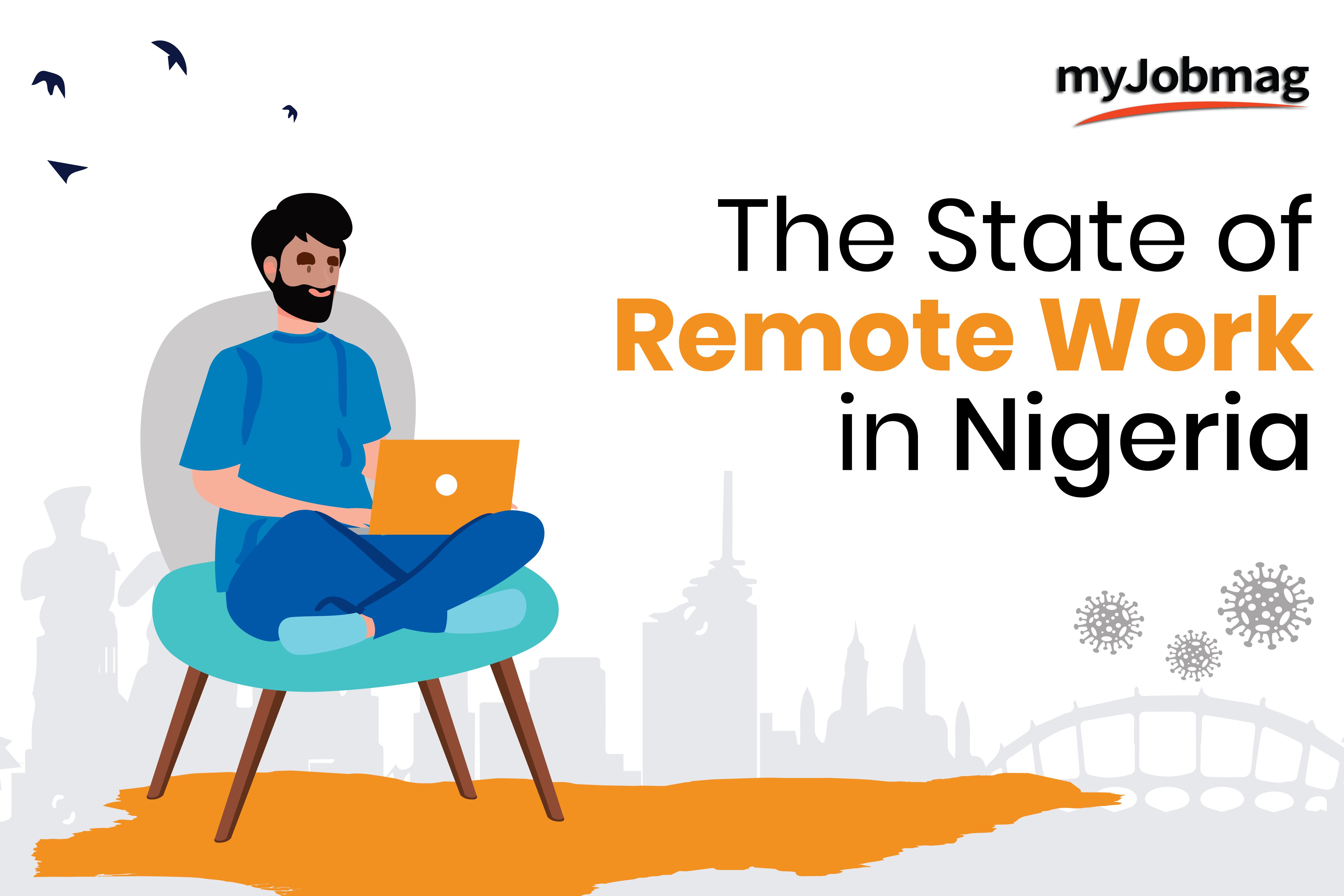
A person that leaves his/her house for work early in the morning and comes back in the evening is seen as hard-working and responsible.
Funny enough this narrative has gradually started to change with the emergence of remote work. Now, going to a physical workspace dedicated to a particular organization is gradually becoming obsolete.
With the sudden halt in the world that came as a result of the COVID-19 pandemic, a lot of organizations were compelled to adopt remote work as the only alternative. With the constant change, it is obvious that remote is here to stay, but the big question is; what is the state of remote work in Nigeria?
If people stare at you with some form of suspicion because you usually turn on your generator in the early hours of the day on weekdays when other people are at work, then you belong to the group of people that work remotely.
Many people in Nigeria still cannot understand how someone can do “office work” without being physically present in the office.
When we look at the global space, we can say that individuals and organizations are quickly adopting the idea of working remotely especially in the digital and tech industries.
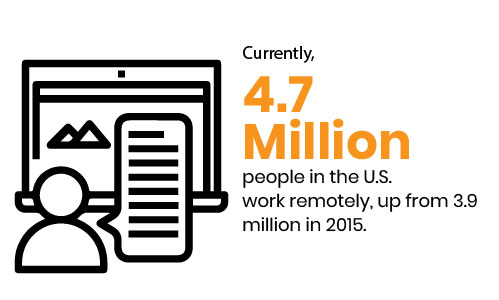
(Source: Flexjobs, 2019)
Despite the obvious advantages of remote work, some companies in Nigeria have swiftly turned back to adopt the traditional 9-5 work schedule.
This leads us to this very important question; has remote work become the way to go in Nigeria?
Looking at how many start-up businesses in Nigeria are embracing remote work as the new normal because of reasons like; reduction in the daily running of the business, a reduced need for some work facilities, etc. Remote work is the future of work in Nigeria especially with technology as an aid.
From the data that we have gathered, we noticed that employers are getting more interested in candidates that can work remotely. We have also seen an increase in the number of remote job vacancies posted from the period of the COVID-19 outbreak to date.
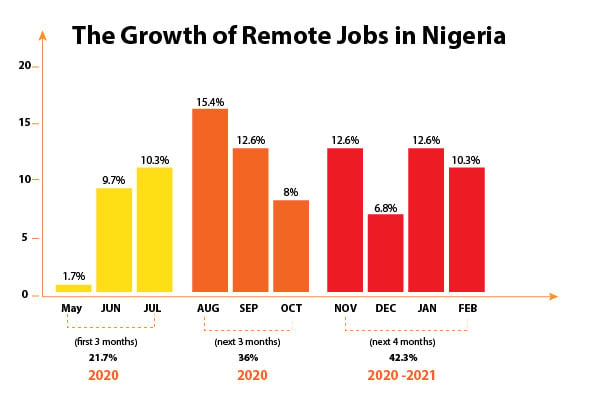
Looking at the data above, it is clear that there is an increased need for remote workers, hence the increase in remote job vacancies.
(Data source:myjobmag.com)
Considering the realities that tech-based start-ups are enjoying as a result of allowing their team members to work remotely, what can we say about the large companies?
When we talk about working remotely in Nigeria, the organizations that appear to be adopting this method of work is start-ups and smaller companies, but why is this?
Carrying out research, we discovered that larger businesses have some organizational structures in place that may not allow them to go fully remote like many start-ups. Larger businesses have:
From a global perspective, it will shock you to know what Google’s former CEO thinks about people working onsite.
"If you want a great company, people need to show up at work because of the water cooler effect and they need to be quite passionate (Eric Schmidt Google former CEO). (source: fast company article)".
Minutes article on remote work reveals that former CEO of Yahoo Marissa Mayer is also not adopting remote work as the new normal as she introduces her "all hands on deck" ultimatum.
Emphasizing the need for a collaboration she goes forward to say; “…people are more collaborative and innovative when they are together”.
The need for collaboration and communication amidst other reasons (like operational schedules, large clientele, etc) are the main reasons why some organizations will prefer to still stick with the traditional 9-5work schedule.
Another concern here is; are companies that have adopted working remotely in Nigeria willing to forgo the benefits of employees working on-site?
“Necessity is the mother of innovation”. This has only become truer when we look at the COVID-19 Pandemic and remote work in Nigeria.
The pandemic grappled with the finance of many companies, so for some organizations to thrive, it became a necessity for them to reduce cost and human contact, and remote work was the answer.
While it may be surprising for you to find out that some employers still find it quite difficult to accept remote work option for their team, others have an entirely positive experience.
Olufunmilade, a Digital media entrepreneur, disclosed to me that working remotely is the way to go for entrepreneurs in Nigeria.
"Working remotely and freelancing has helped me build my business both with local and international clients without spending too much. From the look of things, remote work is the future of work for entrepreneurs in Nigeria".
Ogugua, founder of MyJobMag is one of the people who believe allowing work flexibility for employees enables companies to focus on result-based tracking instead of time-based tracking. Adopting a remote work schedule also helps reduce operational cost.
"We experienced a 21% reduction in the cost of managing our facility, and this can be traced to energy consumption, consumables and other operational costs. However, as a service-driven company, facility management cost is a small fraction of the overall business cost".
MyJobMag has adopted a more blended working system where employees are only required to show up twice a week or more if they are experiencing some difficulty working from their preferred location.
From all that we have gathered, start-ups and IT-based employers seem to be running their businesses smoothly even after adopting the remote work system. Do employees in Nigeria have this same experience?
COVID-19 introduced some major shifts in the world of work. Many employers mandated their workers to work remotely. Twitter required its 4, 900 employees to work from home following the pandemic.
Some organizations in Nigeria have adopted remote work options for their staff members following the pandemic. Now the question is what are the experiences of employees working remotely in Nigeria?
We talked to a few employees working remotely about their experience. This is what we found out:
For Ayodeji, a social media executive is one of the people that will choose to work remotely over being physically present at the office.
“I prefer to work remotely, I work more when I work from my preferred location”
Trust, a content manager, is also one of the people that will choose to work remotely in Nigeria having tried working both remotely and on-site.
“I love to work remotely. If I were to apply for a job, I would prefer to apply for a remote than an onsite job.”
Four out of five employees that we spoke with said they preferred to work remotely. The response we got from the employees’ shows that working remotely seem to be the next route for the future of work in Nigeria.
We talk to some remote workers and they shared some challenges that they experience.
One of our correspondents revealed some of the misconceptions people have about remote workers.
“If you work remotely, people look at you like you are jobless or you are into cybercrime”
Raymond, a content executive shared her view on the downsides of working remotely. In her words
“People have some misconceptions about me working remotely; they think that I do less work and have more free time and that I get more sleep”.
Having a dedicated time for work and personal administration is a challenge for many remote workers including Uche, who works fully remote. “Working remotely can steal into your time as you may tend to work later than usual”.
We did some research and discovered other challenges that remote workers face in Nigeria:
Considering the challenges of working remotely in Nigeria, it appears that many employees will still prefer to work remotely even if it requires them to take up extra cost like; ensuring a steady power supply and stable access to the internet.
The mere benefit of not having to spend hours in traffic especially for those working in Lagos is priceless.
Disgruntled commuter Yinka Ogunnubi is a typical example, recently tweeting:
"Left my house by 5:30 a.m., got to work at 9:10 a.m. This is no longer work, it is suffer-head. Dear Boss, Can I work from home? (Lagos, Nigeria (CNN))"
Remote work may appear to be the solution to the many problems that employees in Nigeria face, but it is also important for employers to consider some of these challenges before flipping the switch.
These are some of the things employees in Nigeria would like for their companies to do to make remote working better.
(This list is arranged based on the order of importance).
.jpg)
Effective communication and bonding are essential for team members of any organization. Creating structures and systems for physical interactions is a smart way to enjoy the benefit of working onsite while adopting the remote work system.
A 2020 survey of 4,700 skilled knowledge workers, funded by Slack, revealed that only 12% want to return to the office full time. The majority (72%) would prefer a hybrid model that combines home and office work.
Opinions seem dual-sided when it comes to how the future of work in Nigeria will look like. While some prefer to work remotely (especially the younger ones), others still prefer the traditional 9-5 as it eliminates some of the challenges we listed earlier.
No wonder Ogugua. B, Founder of MyJobMag refers a blend of both.
"…Going forward, I see forward-looking companies adopting a hybrid approach to work, where employees are allowed to work from anywhere - home or office."
It is shocking to know that working remotely does not equals productivity for everyone. Anthonia, a Human Resources Manager revealed that to us in her interview when she said;
"My productivity is not tied to the work arrangement. I can be productive both onsite and remotely".
The COVID-19 has indeed caused some changes to the world of work. Remote work is one of the major changes that the job market experienced.
As more people began to adopt the remote working system, the need for remote workers increased. Employers started becoming more interested in job roles that are “remote-friendly”. This led to the springing up of some trending job roles.
Some job roles have become more popular in the Nigerian job market and have seen an increase in demand based on job postings.
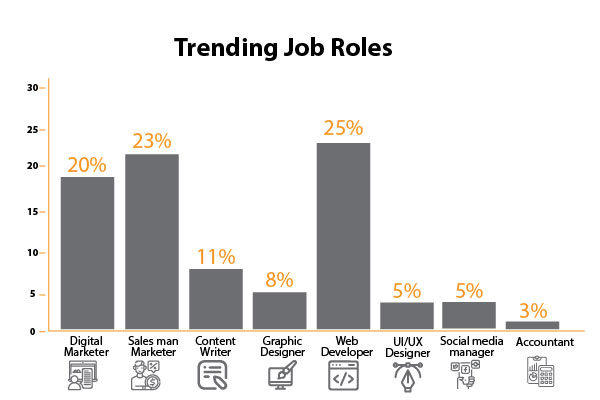
(Data source: MyJobMag)
We have looked at some job roles that started to trend because of the rise of remote work. The COVID-19 pandemic influenced the growth of remote work in Nigeria, but at the same time led to the reduction in job vacancies even in the trending job roles.
This means that organization are still trying to recover from the down times they experienced during the pandemic.
The data below shows the reduction of job vacancies in trending roles from January 2019 to February 2020 and from March 2020 to date.
.jpg)
According to research, there are generally fewer jobs than they were before the pandemic. So if you are actively searching for remote jobs, you should consider acquiring trending skills that will give you an edge over other job candidates.
Regardless of the decline in hiring that some industries experienced as a result of COVID, it is only normal for there to be a surge in demand for certain skills. The pandemic sure brought some challenges, but these challenges brought new opportunities.
Skills that are high on demand:
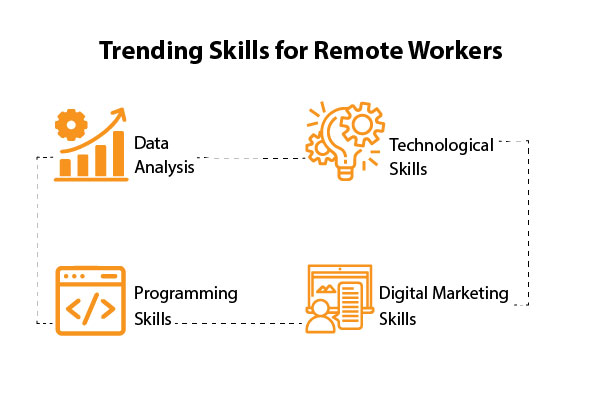
COVID-19 came as a shock to everyone in the world. Regardless of the shock, people managed to cope with the different COVID-19 induced changes.
Some of these changes introduced by the pandemic influenced the rise of remote work as a means of coping with the pandemic.
Trends that sprung from the emergence of COVID-19:
.jpg)
When it comes to working remotely in Nigeria, we have been able to make some conclusion based on the research that we have done.
If you are looking for Nigerian companies hiring for remote roles, you don’t have to worry because we’ve got you covered. check here to see a list of Nigerian companies seeking employees for remote roles.
Leave a Comment